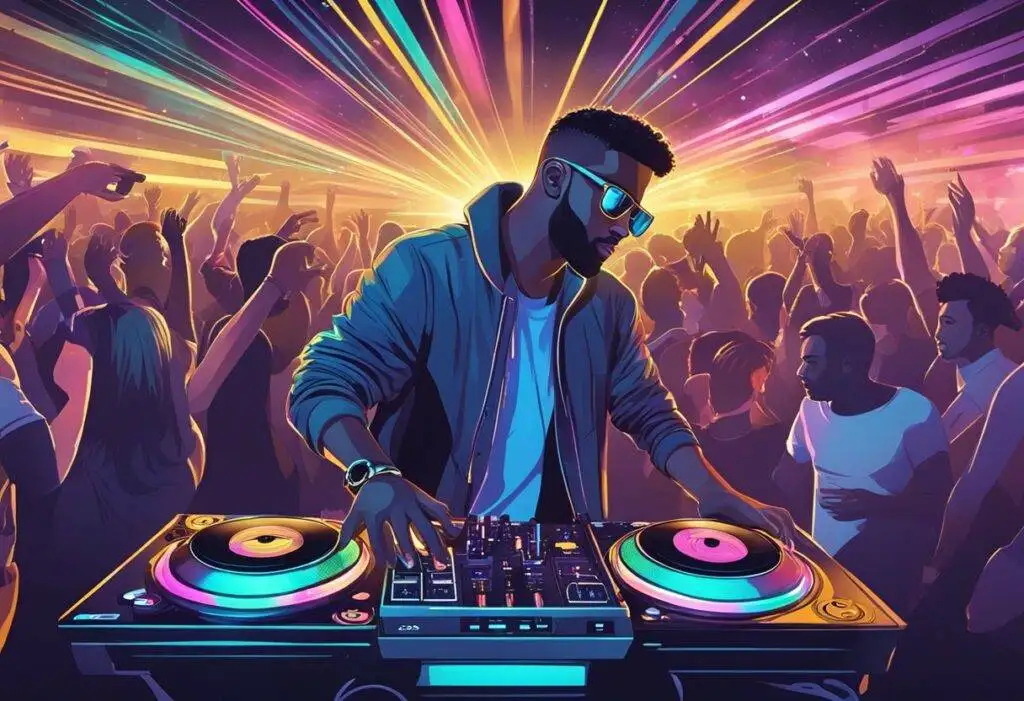In my experience, the hours a DJ works can vary greatly depending on the specific role and the type of events they perform at. For beginners, understanding the landscape of DJ work can be crucial; it’s not just about playing records. It takes time to master the art of reading the room and perfecting the craft, which means that the actual performance is just a portion of the commitment. Preparation and practice often take up as much time, if not more, than the events themselves.

Club DJs, for instance, may perform sets that last anywhere from 2 to 4 hours, but this doesn’t encapsulate the entire workload. When considering the time spent on preparing sets, searching for new music, sound checks, and equipment setup, it becomes clear that the job extends well beyond the visible performance hours. It’s a career that requires passion, as the non-traditional working hours and the behind-the-scenes efforts are substantial components of a DJ’s work life. Balancing personal time with gig opportunities, especially for mobile DJs who may work events like weddings or corporate functions, adds an additional layer of complexity to managing a DJ career.
Key Takeaways
- DJs dedicate significant time to preparation and practice, in addition to actual performance hours.
- Real-time performances typically range from 2 to 4 hours, but can be longer for events and private functions.
- Building a DJ career entails mastering both the technical and performance aspects, necessitating a substantial time commitment.
Understanding the DJ Profession
The DJ profession is multifaceted, encompassing various roles and settings—each demands a specific skill set and level of performance. I will discuss the core responsibilities inherent in this profession and the different types of DJs you might encounter.
Roles and Responsibilities
As a DJ, I am tasked with much more than just playing music tracks. My key responsibilities include music mixing, crowd reading, and maintaining energy at events to ensure a memorable experience for the audience. I must be proficient in selecting and blending tracks seamlessly to match the mood of the event and react to the crowd’s response. In instances where I perform as a club DJ, the emphasis often lies in creating a continuous flow of music that keeps the patrons dancing and engaged.
For those of us choosing the path of a mobile DJ, our duties extend to transporting equipment, setting up sound systems, and often playing a more varied selection of music to cater to different types of events such as weddings, parties, or corporate functions. My skill in adaptability and vast music knowledge are crucial to meet the diverse expectations.
Types of DJs
Club DJs:
- Skill: Advanced mixing, track selection
- Performance: High-energy sets, interact with crowd
- Venues: Nightclubs, bars
Mobile DJs:
- Flexibility: Varying music genres, portable setup
- Events: Weddings, private parties, corporate functions
Radio DJs:
- Engagement: Maintaining listener interest, curating playlists
- Energy: Voice projection, on-air persona
Each type of DJing requires a unique approach. My responsibilities as a club DJ involve energizing a dance floor, while as a mobile DJ, I adapt to private events, and as a radio DJ, I focus on engaging an unseen audience through the airwaves.
As a professional DJ, I blend technical skill with an ability to read and respond to my crowd, whether I’m behind the turntables at a club, animating a wedding, or hosting a radio show. The performance is always about connecting with my audience and delivering an unforgettable experience.
Essential DJ Equipment and Software
To thrive in the dynamic world of DJing, it’s imperative to have the right tools and technology at your disposal. A well-assembled DJ setup, comprising both hardware and software, enables you to blend tracks seamlessly and keep the crowd engaged. Below, I’ll detail the fundamental gear and programs that are crucial to any DJ’s performance.
Mixing Consoles and Turntables
Mixing Consoles: The centerpiece of DJ equipment is the mixer. It’s the command center where I control the audio levels, EQ settings, and crossfade between tracks, ensuring smooth transitions. Mixers can range from basic two-channel versions for beginners to sophisticated multi-channel boards for professionals.
- Turntables: For turntablists, turntables remain essential for scratching and beat-matching. While time-coded vinyl systems integrate with digital libraries, traditional turntables offer the authentic tactile feel that many DJs still prefer.
I must mention that professional DJ setups can be daunting at first, but they allow for creative freedom during performances.
Music Production Software
Software: In the contemporary DJ’s arsenal, software is as fundamental as hardware. Programs like Serato, Traktor, and Ableton Live provide me with a multitude of features like looping, cues, and effects that are indispensable for crafting a lively set.
- Features: These programs enable me to manipulate audio files, synchronize tracks, and even create my own music. They act as a digital extension of my creative intent, often integrating seamlessly with my hardware.
The evolution of DJ technology continues to revolutionize the way I perform and interact with my audience, making the music experience more engaging than ever.
Skills and Techniques for Successful DJing
In my experience, two foundational pillars in DJing involve the art of choosing the right music for the moment and the technical skill of merging tracks seamlessly. These competencies ensure a dancefloor remains energetic and engaged.
Music Selection and Curation
I prioritize music selection and curation as key to setting the mood and captivating an audience. My process involves:
- Analyzing the crowd: I closely observe the demographics and reactions to distill what genres might resonate best, whether it is house, techno, hip-hop, or something else entirely.
- Building a vast library: I amass a diverse collection of tracks, mindful of different energies, tempos, and moods. This variety equips me to transition smoothly between songs while maintaining the flow of the night.
Mastering Beatmatching and Mixing
Beatmatching and mixing, in my practice, are skills of precision and timing. They propel my performances in the following ways:
- Syncing beats: I align the beats of two tracks in tempo and phase, ensuring a seamless transition that often goes unnoticed by the crowd. This is the bedrock of a fluid set.
- Applying mixing techniques: I use EQing to balance the bass, mid, and treble frequencies, creating a harmonious blend. Advanced techniques like fading, filtering, and layering also play a part in my sets to add texture and excitement.
Building a DJ Career
In my journey of building a DJ career, the early stages of learning and networking laid the groundwork for future opportunities, personal brand development, and income potential.
Starting as a Beginner DJ
As a beginner DJ, my initial focus was on practice and mastering the craft. Hours were spent mixing tracks, understanding beatmatching, and learning to read the crowd. I made it a point to practice daily, often documenting my progress on social media to build an online presence that showcased my growing skills and unique style.
Daily Practice Routine
- Minimum of 2 hours of mixing
- Weekly review of new music releases
- Monthly recording of a demo set
Online Presence Development
- Regular updates on Instagram and Twitter
- Uploading mixes on SoundCloud and Mixcloud
- Engaging with followers and other DJs
Growth and Networking Strategies
Networking was, and continues to be, a pivotal part of my career growth. Establishing connections within the industry led to gig opportunities and collaborations. I attended local DJ events, engaged with established professionals, and shared my mixes on social media platforms to widen my reach.
Networking Approaches
- Attending music festivals and DJ workshops
- Collaborating on sets with other DJs
- Joining online DJ communities
Personal Branding Efforts
- Developing a distinctive logo and visual theme for my profiles
- Crafting a compelling bio that communicates my unique approach
- Sharing behind-the-scenes content to connect with my audience
Frequently Asked Questions

In my experience, questions regarding the scope and scale of a DJ’s work are common. I’ll address some of the most frequently asked ones, shedding light on the intricacies of a DJ’s professional life.
What is the typical duration of a DJ’s set at a wedding?
Typically, my sets at weddings last anywhere from 4 to 6 hours, taking into account the various phases of the event, from cocktails to the last dance.
How many hours does a DJ typically perform in a club or event setting?
In clubs or event settings, I often perform sets that range from 1 to 4 hours, depending on the event’s requirements and the lineup of DJs.
How many tracks can a DJ expect to play within an hour-long set?
Within an hour, I might mix anywhere from 15 to 30 tracks, but this largely varies based on the genre and the transitions I choose.
What are the usual responsibilities of a DJ during their performance?
My responsibilities during a performance include reading the crowd, selecting and mixing tracks, maintaining sound levels, and ensuring a smooth flow to keep the energy up.
What is the average income range for professional DJs?
Professional DJs can expect an income range that varies widely; reports suggest an average hourly rate of $22.89 and an average annual salary around $47,611, contingent upon experience and gig frequency.
What factors determine the length of a DJ’s performance at an event?
The length of my performance can depend on several factors, including the type of event, client specifications, and the presence of other performers. Venue curfews and audience engagement are additional determinants.
